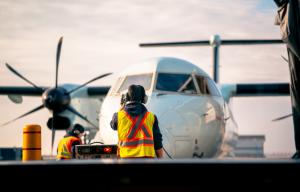The Rising Demand for Skilled Professionals in the Aviation Sector
Aviation offers exciting roles for new talent. With the right skills and training, one can thrive in this fast-growing, innovative global industry.
Aviation is evolving fast, and so is the demand for fresh talent. At Aeroates, we open doors to real opportunities, helping future professionals navigate their first steps with confidence and clarity.”
KALKARA, SOUTH EAST, MALTA, July 8, 2025 /EINPresswire.com/ -- The increase in international air travel and continuous technological improvements are driving the aviation industry's sustained growth. The need for qualified workers in a variety of roles, from technical and operational jobs to management and customer service, is growing along with the industry.— Giovanna Mirabile
By 2034, the worldwide aviation industry is expected to require almost 1.465 million additional workers, according to the CAE 2025 Aviation Talent Forecast. This includes 71,000 air traffic controllers, 678,000 cabin crew members, 416,000 aircraft maintenance workers, and 300,000 new pilots. These figures show the industry's ongoing expansion as more people take to the skies, in addition to the need to replace those retiring.
The aviation industry plays an important role when it comes to the global economy, far beyond the airports and aircraft most people see. According to the Air Transport Action Group (ATAG), aviation supported around 86.5 million jobs worldwide in 2023. This includes 11.6 million people working directly in aviation, with a further 75 million jobs linked to tourism and other related industries. These numbers highlight how critical the industry is not only as a provider of transport, but as a major driver of employment and economic activity on a global scale.
Careers in aviation cover a large spectrum of specialisations. Each of these vital roles plays an important part in aviation by keeping air travel safe and efficient. Pilots, for instance, must complete intense training and earn qualifications such as the Commercial Pilot Licence (CPL) and Airline Transport Pilot Licence (ATPL). Typically, a recognized flying training institution handles this. Under strict regulatory rules, maintenance specialists perform routine servicing, repairs, and inspections with an emphasis on the technical well-being of aircraft.
The coordination of aircraft movements in the air and on the ground, on the other hand, is the responsibility of air traffic controllers, who mainly depend on effective communication, keen situational awareness, and the capacity for quick, precise decision-making.
Cabin crew play a key role in both safety and service, helping to manage onboard procedures, assist passengers with their needs, and respond to emergencies. Their responsibilities are supported by regulated training programmes that prepare them for a wide range of scenarios. On the ground, airport operations managers keep everything running smoothly, from managing flight schedules and coordinating ground staff to overseeing logistics and customer service.
According to the International Air Transport Association (IATA), airports around the world handled over 4.7 billion passengers in 2023, showing the scale and complexity of airport operations. The need for experts in fields like aviation cybersecurity, data analysis, and sustainability is increasing as the sector continues to develop, indicating a move toward more technologically advanced and environmentally conscious operations.
Certain skills are always needed in these different professions. To ensure safe and effective operations in a highly regulated, fast-paced environment, one must have the following vital skills: problem-solving, teamwork, flexibility, communication, and attention to detail.
There are several ways to begin a career in aviation, but most start with formal education or specialist training through accredited programmes. Whether through internships, apprenticeships, or entry-level jobs, gaining practical experience can be particularly helpful for developing useful abilities and comprehending how the sector works on a daily basis.
Flexible solutions like blended learning or modular courses can provide a method for those coming from other sectors to retrain without having to start from scratch. Participating in industry events or professional networks can also be beneficial, as it supports individuals in networking and staying up-to-date with opportunities and advancements in their sector.
Sustainability and digital innovation are becoming more and more important as the aviation industry develops. The sector is seeing a number of significant changes, including the introduction of electric aircraft, the use of next-generation avionics, and sustainable aviation fuels (SAF). The qualifications and skills needed by the workforce are also being impacted by these changes, in addition to the technology now in use.
Aeroates, an organisation supporting aviation jobs and career development, notes that continued investment in training and workforce planning will be essential to meeting these future challenges. As demand grows and roles evolve, maintaining a steady pipeline of skilled professionals will be vital to ensuring the resilience and progress of the global aviation sector.
Giovanna Mirabile
Aeroates Ltd
+356 2122 7333
info@aeroates.com
Visit us on social media:
LinkedIn
Instagram
Facebook
YouTube
Legal Disclaimer:
EIN Presswire provides this news content "as is" without warranty of any kind. We do not accept any responsibility or liability for the accuracy, content, images, videos, licenses, completeness, legality, or reliability of the information contained in this article. If you have any complaints or copyright issues related to this article, kindly contact the author above.

